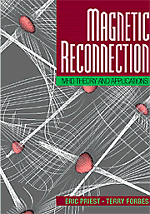Book contents
- Frontmatter
- Contents
- Preface
- 1 Introduction
- 2 Current-Sheet Formation
- 3 Magnetic Annihilation
- 4 Steady Reconnection: The Classical Solutions
- 5 Steady Reconnection: New Generation of Fast Regimes
- 6 Unsteady Reconnection: The Tearing Mode
- 7 Unsteady Reconnection: Other Approaches
- 8 Reconnection in Three Dimensions
- 9 Laboratory Applications
- 10 Magnetospheric Applications
- 11 Solar Applications
- 12 Astrophysical Applications
- 13 Particle Acceleration
- References
- Appendix 1 Notation
- Appendix 2 Units
- Appendix 3 Useful Expressions
- Index
13 - Particle Acceleration
Published online by Cambridge University Press: 14 October 2009
- Frontmatter
- Contents
- Preface
- 1 Introduction
- 2 Current-Sheet Formation
- 3 Magnetic Annihilation
- 4 Steady Reconnection: The Classical Solutions
- 5 Steady Reconnection: New Generation of Fast Regimes
- 6 Unsteady Reconnection: The Tearing Mode
- 7 Unsteady Reconnection: Other Approaches
- 8 Reconnection in Three Dimensions
- 9 Laboratory Applications
- 10 Magnetospheric Applications
- 11 Solar Applications
- 12 Astrophysical Applications
- 13 Particle Acceleration
- References
- Appendix 1 Notation
- Appendix 2 Units
- Appendix 3 Useful Expressions
- Index
Summary
This book is devoted almost entirely to magnetohydrodynamic theories of reconnection and does not review the extensive literature on collisionless processes. Such processes are critical for the production of energetic particles by reconnection, but they constitute an enormous topic on which a whole text could easily be written. However, since the production of fast charged particles is one of the main consequences of reconnection in the cosmos, we feel it is important to devote some space to a brief discussion of this subject.
As we shall see, many particle acceleration theories rely, either implicitly or explicitly, on MHD concepts to supply information about the large-scale distribution of magnetic and electric fields. In the simplest theories (§13.1), the energetic particles are directly accelerated by an electric field whose behaviour is assumed to be known. In this case MHD models are often used to justify the particular choices made for the fields. However, even in more complex theories, MHD concepts such as turbulence (§13.2) and shock waves (§13.3) are often invoked. MHD theory is complemented by kinetic theory, which provides a great deal of additional information about the local plasma behaviour.
Energetic particles are common throughout the universe and reveal at once that it is not as a whole in thermodynamic equilibrium. They show up, for example, as cosmic rays incident on our atmosphere; they produce synchrotron emission from distant radio galaxies; and they are detected in the solar wind upstream of shocks produced by the Earth's magnetosphere and by coronal mass ejections.
- Type
- Chapter
- Information
- Magnetic ReconnectionMHD Theory and Applications, pp. 460 - 518Publisher: Cambridge University PressPrint publication year: 2000
- 1
- Cited by



